Making peace on the roof
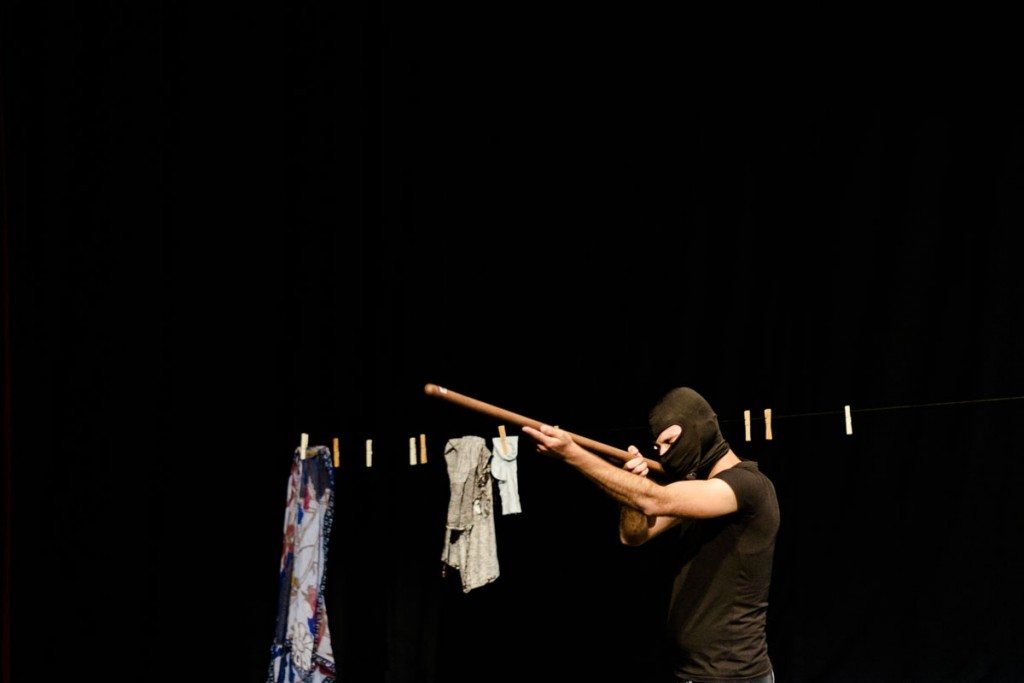 As the play ends, the actors get back on stage and line up close to each other. They are all young, dressed in jeans, t-shirts and sneakers. Khodor Mokhaiber, in the middle, puts his arm around the shoulders of Ali Amoun, standing on his right. The spotlight illuminates their faces and t-shirts, paints the black around them darker.
As the play ends, the actors get back on stage and line up close to each other. They are all young, dressed in jeans, t-shirts and sneakers. Khodor Mokhaiber, in the middle, puts his arm around the shoulders of Ali Amoun, standing on his right. The spotlight illuminates their faces and t-shirts, paints the black around them darker.
“This guy,” says Khodor Mokhaiber, “I would’ve never met before. Now he’s my brother.”
The applauds continue as the microphone is handed over to Lucien Bourjeily, one of Lebanon’s most known theatre directors. He spent five months working with the ensemble of 16 first-time actors, directing the show that just ended: Love and War on the Rooftops – A Tripolitan Tale.
“I have learned about a sort of life that’s present all over Lebanon. Where people help and support each other.”
It might not be what many would guess, but he’s talking about Bab al-Tabbaneh and Jabal Mohsen, two neighbourhoods in the northern Lebanese city of Tripoli. The two of them are next-door neighbours, but also long-time notorious adversaries. After the Lebanese Civil War ended in 1990, hostilities between them lingered, and on-and-off fighting continues until today. Since the war in Syria began, divisions between Bab al-Tabbaneh and Jabal Mohsen — the latter which, according to the logic of identity politics, stands with the Assad regime; the former against — have grown deeper, and many have been killed.
That animosity is also what brought the actors on stage together. Last year, March, a Lebanese NGO working with peace-building and civil rights, approached local organisations working in Bab al-Tabbaneh and Jabal Mohsen.
“We asked them to help us recruit actors to put up a play. It was difficult at times in the beginning, there were tensions and some didn’t show up. But things started to change quickly when they saw that the play was inspired by their lives,” says Lea Baroudi, co-founder of March.
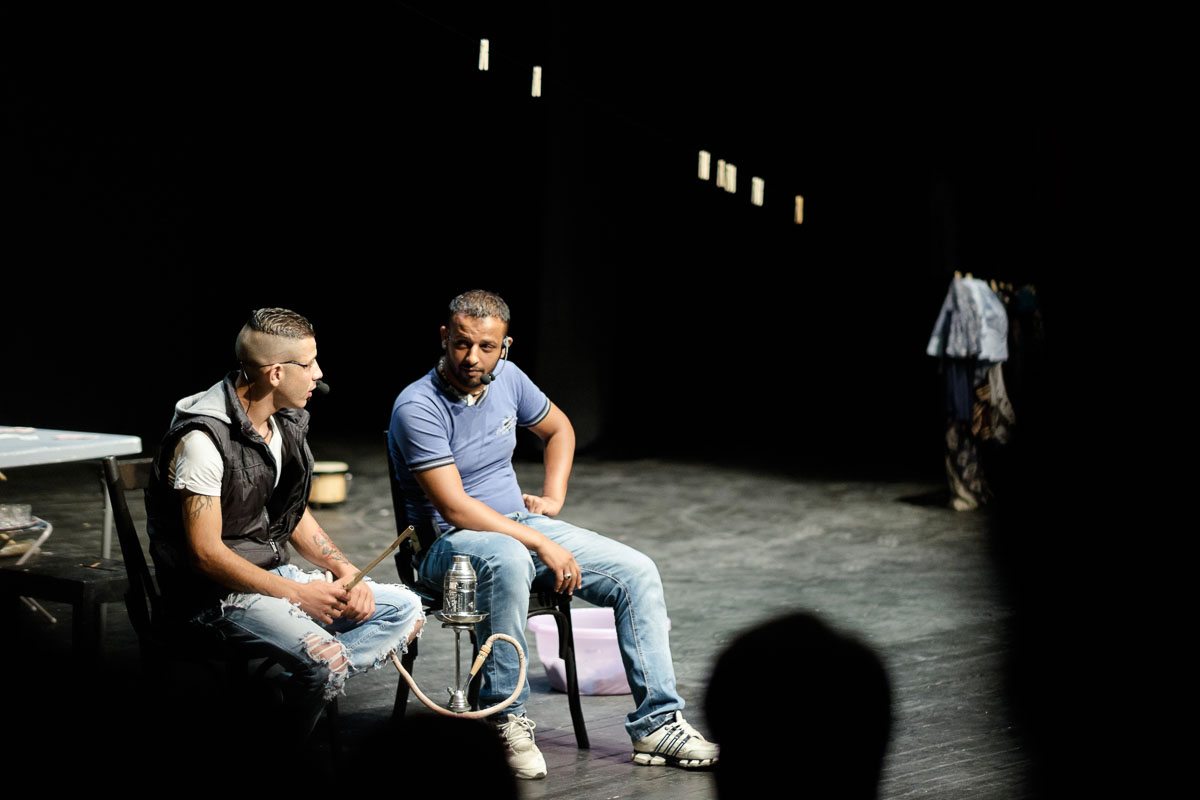
The actors come from different backgrounds, but share on thing in common: they have all, in one way or another, taken part in the local fighting. Many have lost friends, used violence themselves. Ali Amoun has been shot four times. “First in 2008, then in 2010. Then, two more times recently.”
The bullets that hit him came from Bab al-Tabbaneh, down the hill from Jabal Mohsen, where Ali Amoun has lived all his life. That’s also where about half the acting team comes from; the other half is from Bab al-Tabbaneh. Two actors come from Qoubbeh, another area in Tripoli, and one is from the Palestinian camp Beddawi.
“I didn’t know anyone from the jabal before, and I never imagined that I would. I never went up there. Since I was a kid I only knew that we were fighting them,” says Khodor Mokhaiber.
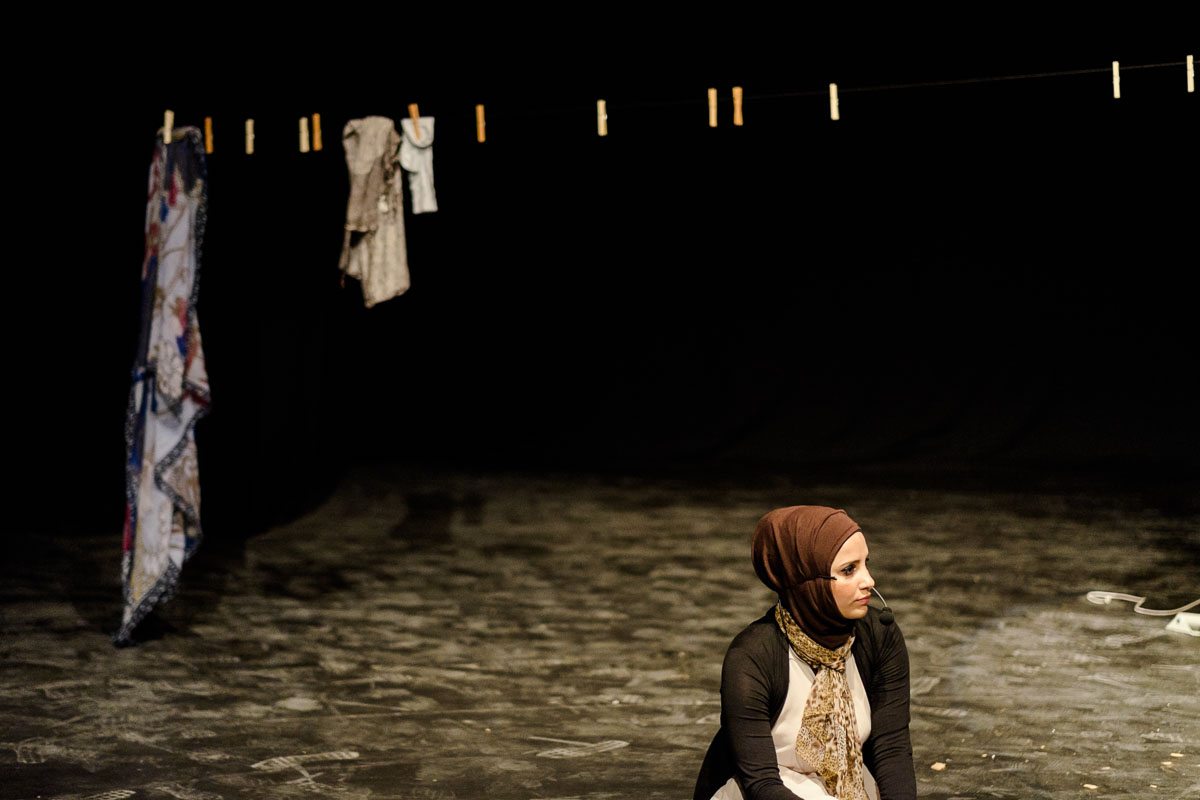
A few weeks earlier, he is seated at an outdoors event in Bab al-Tabbaneh during one of the last evenings of Ramadan. It’s nearing midnight and the sky is dark. The air is soft, not yet weighed down by the summer heat. A small stage has been set up, with plastic chairs lined up in front. A comedian gets up and starts talking, members of a youth organisation walk around giving out dates and rice puddings. A small kid with sandals and worn pants keeps following them around — he finds short cuts and sneaks quickly in and out between the chairs, to always stay within reach of the trays with candy.
In front, on the same row as Khodor Mukhaiber, sits Ali Amoun. Any previous Ramadan, finding him with friends in Bab al-Tabbaneh would have never happened.
“I used to think that all of Tabbaneh was Fatah el-Islam and terrorists. This is what they told us. But all of that has changed now. When we started doing the play together, we saw that we’re actually the same. They have the same issues down here. No jobs, politicians just using people.”
Ali Amoun is right: the two neighbourhoods share a lot in common. Unemployment, a lack of social services and shared spaces. High levels of poverty. In recent decades, northern Lebanon has grown more and more impoverished, and is now home to more poor households than any other part of the country. Tripoli — a city with beautiful old architecture, a long intellectual history and a strong youth movement — is today a place where 57 per cent live in poverty. The numbers for Bab al-Tabbaneh and Jabal Mohsen are even higher: 87 and 69 per cent respectively.
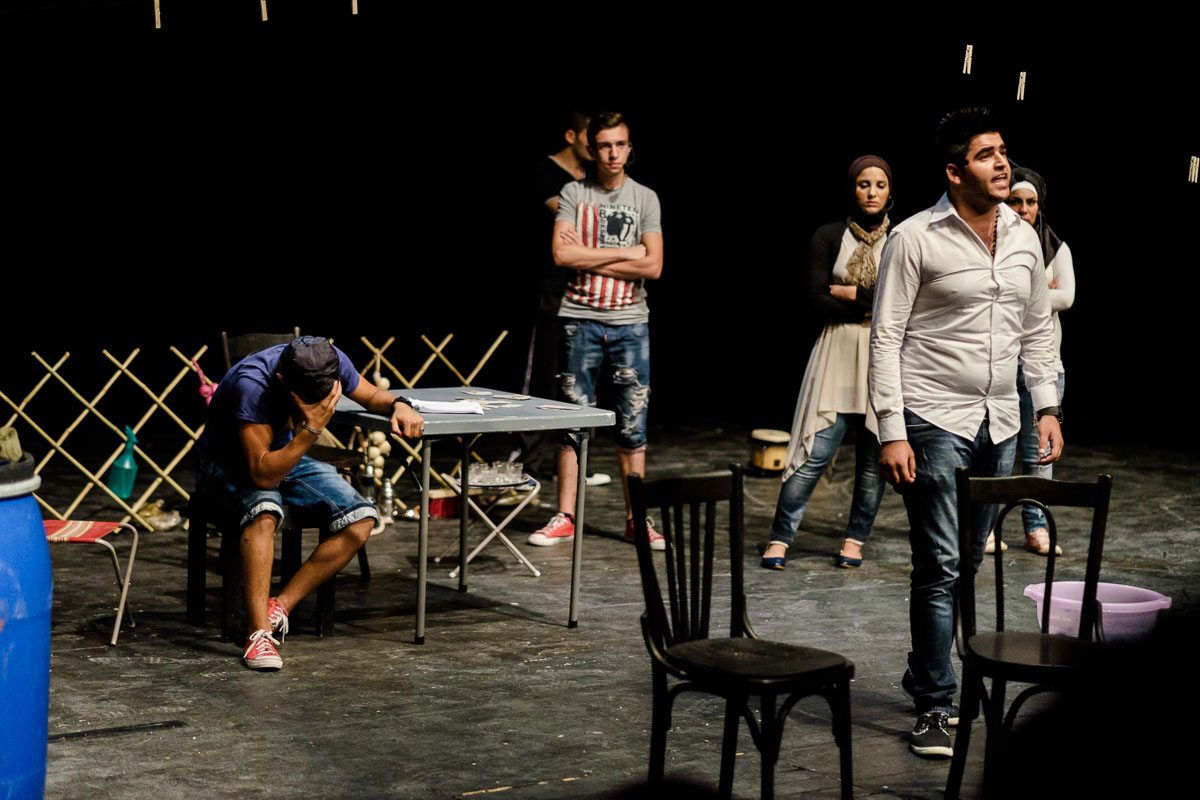 This reality is what set the direction of Lucien Bourjeily’s play, which incorporates off-stage stories and experiences from the actors. It revolves around a love story —– the most famous one in literary history, but with Romeo and Juliet replaced by Ali and Aisha.
This reality is what set the direction of Lucien Bourjeily’s play, which incorporates off-stage stories and experiences from the actors. It revolves around a love story —– the most famous one in literary history, but with Romeo and Juliet replaced by Ali and Aisha.
“[Bab al-Tabbaneh and Jabal Mohsen] are dealing with the same kind of problems that Shakespeare wrote about. But we are telling the stories of the people, not the sectarianism,” says Lea Baroudi.
From start to finish, the play is set on a rooftop, overlooking Tripoli’s urban landscape. The roof becomes the scene for daily events —– small talk between friends, laundry drying, narguileh smoking. A card game and a discussion about not getting a job, even when pretending to be from places like Batroun or Antelias —– something taken straight from the lives of the participants.
“Let me tell you about trying to get a job. You go to a company —– Yaatek el aafieh, tfaddal, drink a cup of coffee. Please, let me see your resume. Ah, so you’re from Jabal Mohsen? The door opens immediately. This happens all the time,” says Ali Amoun.
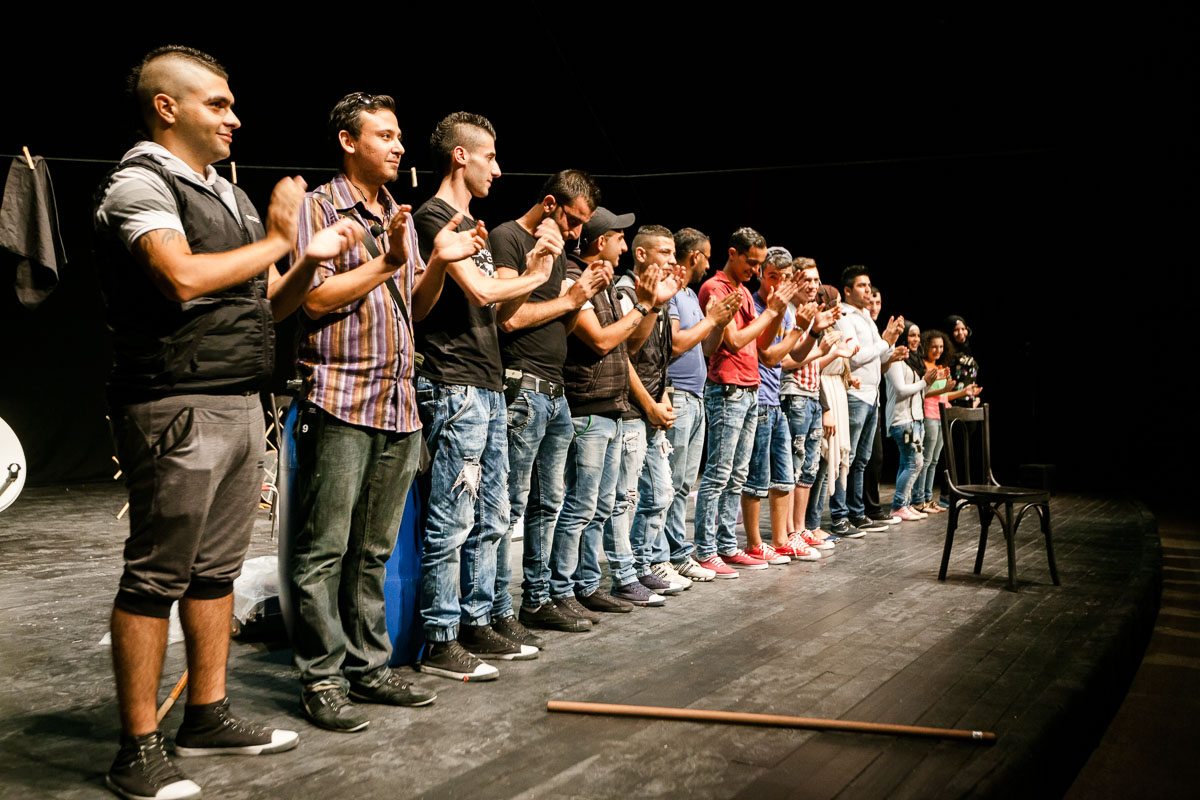 Khodor Mokhaiber fills in, shares a similar story, where he pretended to be from Kaslik, a neighbourhood just north of Beirut.
Khodor Mokhaiber fills in, shares a similar story, where he pretended to be from Kaslik, a neighbourhood just north of Beirut.
Both know that changing perceptions about their neighbourhoods is not done easily. But for them personally at least, change has begun.
“The most important thing I learned is to not get provoked any more. I used to be provoked easily, now I don’t. That’s what can make change,” says Khodor Mokhaiber.
Another thing has changed as well —– there is one point during the play when they say that people from Bab al-Tabbaneh and Jabal Mohsen never meet, only in prison. There’s other occasions now too.
The last chance to see Love and War on the Rooftops – A Tripolitan Tale is on Friday August 7 at Masrah el-Medina in Hamra, Beirut. The performance starts at 8 pm.







